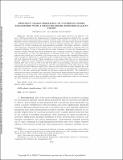Efficient Characterization of Uncertain Model Parameters with a Reduced-Order Ensemble Kalman Filter
Author(s)
Lin, Binghuai; McLaughlin, Dennis
DownloadLin-2014-Efficient characteri.pdf (1.149Mb)
PUBLISHER_POLICY
Publisher Policy
Article is made available in accordance with the publisher's policy and may be subject to US copyright law. Please refer to the publisher's site for terms of use.
Terms of use
Metadata
Show full item recordAbstract
Spatially variable model parameters are often highly uncertain and difficult to observe. This has prompted the widespread use of Bayesian characterization methods that can infer parameter values from measurements of related variables, while explicitly accounting for uncertainty. Ensemble versions of Bayesian characterization are particularly convenient when uncertain variables have complex spatial structures that do not conform to Gaussian descriptions. However, ensemble methods can be time consuming for high-dimensional problems. This paper describes a reduced-order approach to ensemble characterization that is particularly well suited for subsurface flow and transport problems. It uses a truncated discrete cosine transform to reduce the dimensionality of spatially variable time-invariant model parameters and a nonlinear extension of principle orthogonal decomposition to reduce the dimensionality of dynamic model states. The resulting nonlinear reduced-order model can be included in the forecast step of a reduced-order ensemble Kalman filter. These concepts are illustrated in a subsurface solute transport problem using ensembles produced by full- and reduced-order models. These ensembles are very similar when there are no measurement updates. When the forecast ensemble is recursively updated with measurements the reduced-order Kalman filter does at least as well as the full-order filter in characterizing a dynamic solute plume, even though its augmented state dimension is only $2\%$ of the dimension of the full-order state. This substantial increase in efficiency implies that a reduced-order filter with the same ensemble size as its full-order counterpart can give comparable performance for orders of magnitude less computational effort or it can use a much larger ensemble for the same computational effort. The possibility of substantial increases in ensemble size could lead to performance improvements through reductions in sampling error and in the rank of the ensemble null space. Also, a reduced-order model similar to the one described here could be used in ensemble real-time control applications, where it can decrease the effort required for both characterization and control.
Date issued
2014-03Department
Massachusetts Institute of Technology. Department of Civil and Environmental EngineeringJournal
SIAM Journal on Scientific Computing
Publisher
Society for Industrial and Applied Mathematics
Citation
Lin, Binghuai, and Dennis McLaughlin. “Efficient Characterization of Uncertain Model Parameters with a Reduced-Order Ensemble Kalman Filter.” SIAM Journal on Scientific Computing 36, no. 2 (January 2014): B198–B224. © 2014, Society for Industrial and Applied Mathematics
Version: Final published version
ISSN
1064-8275
1095-7197